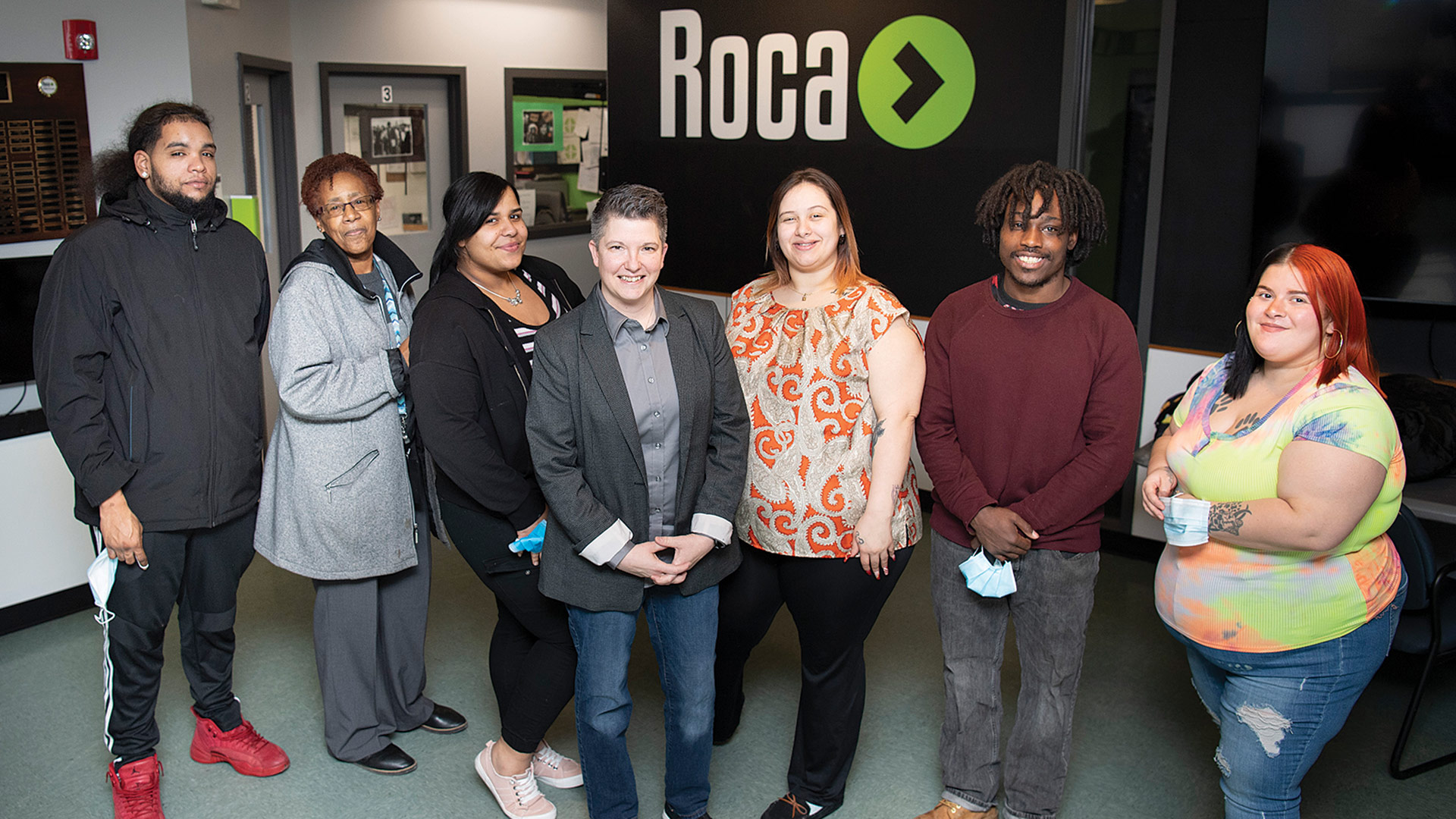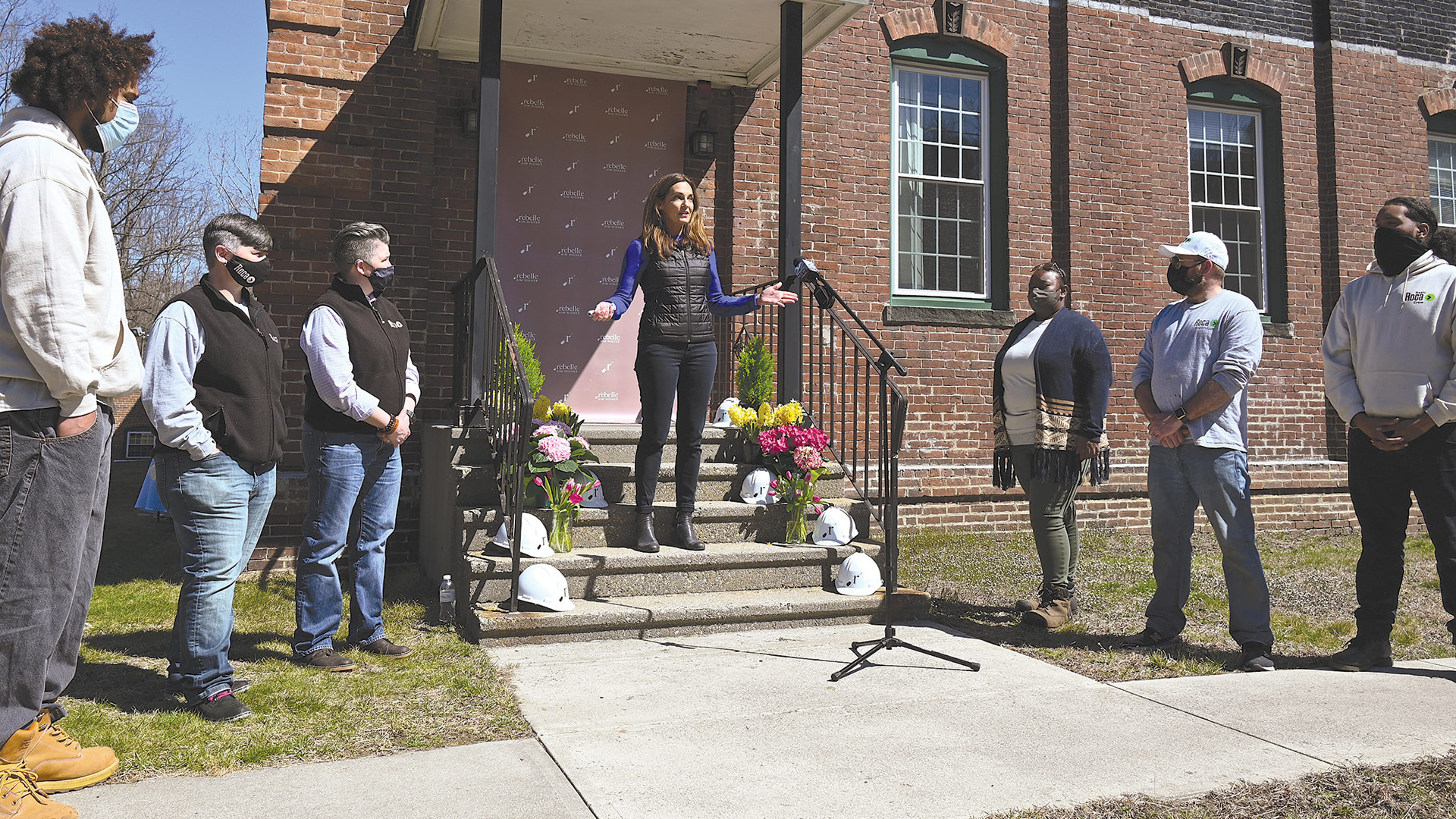This Unique Program Proves That Meaningful, Lasting Change is Possible

When BusinessWest first caught up with Trevor Gayle in the winter of 2015, he was a relatively new employee of Chase Management in Springfield.
A recent ‘graduate’ of the Roca program, which helps high-risk individuals — those who have been incarcerated, are in gangs, have substance-abuse issues, or have dropped out of school — Gayle was handling a wide range of duties for Chase, a property-management firm, from painting to snow removal to apartment-turnover work.
He was also learning what it took to be a good employee and putting to work lessons learned while in Roca that would help him keep his past — he spent six months in jail for sitting in the seat next to a friend who shot and wounded an individual as he approached their vehicle — from becoming his future.
Today, he is superintendent of a huge — as in 447-unit — apartment complex in Groton, Conn., and has several people working under his supervision.
As he reflects on his Roca experience and how it helped him get from where he was — behind bars — to where he is today, he said simply, “I learned how to be my own leader.”
Not all Roca stories have such positive trend lines, but many of them do. And it is transformations like this that Molly Baldwin had in mind when she started Roca in Chelsea in 1988 to help transform the lives of young, at-risk men. The concept, as summed up in the marketing slogan “less jail time, more future,” is simple — use street outreach, data-driven case management, stage-based education, and employment training to reduce individuals’ involvement in crime, keep them out of jail, and help them get jobs — and perhaps a career.
In recent years, the program has been expanded to include young mothers facing challenges ranging from a lack of education and work experience to gang involvement, drug and alcohol use, violence, abuse, trauma, and more. And the goals for this constituency are the same — to help participants heal from their hurt and anger and gain the tools needed to achieve success later on.
“Our mothers’ program is really about parenting,” said Christine Judd, the indefatigable director of Roca’s programs in Springfield and Holyoke. “It’s helping them be better parents. It’s helping them overcome substance abuse. Many of them are victims of domestic violence, and some are victims of sexual violence. These are trauma-based services aimed at making them better parents.”
Roca’s official mission is to “disrupt the cycle of incarceration and poverty by helping people transform their lives,” Judd said. And it does this through an intense, three- or four-year intervention model (more on it later) that, at its core, recognizes that meaningful, lasting change does not happen overnight.

Hampden County District Attorney Anthony Gulluni says Roca works to help people “disentangle” themselves from the trauma in their lives.
And it also does it through partnerships — with constituencies ranging from law-enforcement officials to private business owners and managers who employ participants — that essentially involve the entire community in the work to keep young people on a path to success.
Hampden County District Attorney Anthony Gulluni is one of those partners. Over the years, and especially through a new program he created, the Emerging Adult Court of Hope (EACH), he has helped many at-risk young people find the Roca program.
And what they find, he said, is a support system like none other in this region, one committed to helping them traverse the whitewater in their lives and get on a course that enables them to be productive members of society.
“Our young people, and the young people in EACH in particular, have had so many disadvantages and so many hurdles put in front of them, from day one — lack of parenting, lack of mentorship, lack of positive role models, lack of opportunity — just tough environments,” Gulluni explained. “They’ve suffered so much trauma, and that’s stuff that lives with people. And Roca works to disentangle that and works to support these young people and help them see better things and do better things.”
As noted, a number of area employers have also become partners with Roca, providing employment opportunities to participants. Several area companies, large and small, have hired graduates or have plans to do so. They include manufacturers such as Meredith Springfield in Ludlow, maker of plastic products, and McKenzie Vault in East Longmeadow, which produces cremation urns; distributors such as J. Polep in Chicopee; landscaping firms; municipal public-works departments; and Baystate Health, which expects to soon have some graduates of the program for young mothers working in its Hospitality Department.
AnnaMarie Golden, director of Community Relations at Baystate Health, said the system was already a partner with Roca, with members of its trauma and social-work teams meeting with participants, including those in the young mothers’ program. Through that involvement, the system became aware of another need — for employment opportunities for these women.
“One of the entry doors at Baystate is our Hospitality department — food services and guest services,” she explained. “Our goal is to have them get their foot in the door at Baystate, but the ultimate goal is to have them think about what the next steps might be and consider career steps within the organization if there is interest to stay in the healthcare field.”

Trevor Gayle says Roca has helped him put his past — and the streets — behind him.
It is sentiments like these that certainly help explain why Roca is worthy of that designation Difference Maker. It is making a huge difference in the lives of participants in its programs, and a huge difference in this region as well.
Change Agents
Judd told BusinessWest that, while words can be used to sum up Roca’s mission and its importance to the region, numbers tell the story effectively as well. And she has plenty of them at the ready. Here are some, courtesy of a recent study involving participants:
• While more than 85% of Roca’s young men come to the agency with a violent record, four out of five stop engaging in violent crime;
• Only 33% of Roca’s young men who served from 2012 to 2019 recidivated within three years, compared to the state’s recidivism rate of 47% to 56%;
• 54% who practiced cognitive behavioral therapy (CBT) made measurable emotional-regulation gains;
• 74% who completed the first two years were placed in jobs, and 71% held their job for six months or longer; and
• 95% who completed the first two years were not reincarcerated.
As for the programming involving young mothers:
• 52% of open child-welfare (MA-DCF) cases closed;
• 85% demonstrated workforce-readiness gains;
• 74% who completed the first two years placed in outside jobs; and
• In Springfield, between 2010 and 2020, the program served 761 participants and boasts a 78% employment-placement rate; 82 of participants retained employment for three months or longer, 74% had no new arrests, and 88% had no new incarcerations.
Together, these numbers back up what Gulluni, Golden, Judd, and others said about Roca’s ability to make all-important change possible for its participants.
It does this, Judd said, through an intervention model that is rooted in evidence-based practices of community corrections, deep studies of behavior-change models (stages of change and CBT, among others), brain development, and three decades of critical data collection and on-the-ground work with young people.
“They’ve suffered so much trauma, and that’s stuff that lives with people. And Roca works to disentangle that and works to support these young people and help them see better things and do better things.”
The model, she explained, has five core components: relentless outreach, transformational relationships, tailored programming designed to withstand relapse and the comings and goings of young people in traditional learning or work environments, an engaged-institutions strategy to support young people and help them move out of the criminal-justice system, and performance-based management.
One of the keys to the program, Judd said, is that cognitive behavioral theory, which she described as a way to understand how situations affect what people think and say in their heads, what they feel in their bodies, and what they do in response. Practicing CBT helps individuals identify a cycle, stop, use a skill, and make a choice instead of reacting.
Gayle credited CBT with helping him put street reflexes to situations — those that often lead to violence and incarceration — behind him, to be replaced by more measured, reasoned responses. And he continues to practice CBT in his current position in Connecticut.
Finding Hope
Perhaps the best way to fully appreciate how Roca is changing lives is to talk with current participants in the program.
People like Tyreice Harper, 25, from Springfield.
He’s actually in his second stint with Roca. The first came when he was 17, and he admits that he just wasn’t ready for the regimen and the “environment” at the time, and wound up reverting back to a life that landed him in several different Department of Youth Services (DYS) facilities across the region.
“I was locked up … for armed robbery,” he said, adding that, after a three-and-a-half-year stint at the state’s maximum-security prison in Shirley, he was ready to give Roca another try, especially after conversations with ‘lifers’ at the ‘max’ — those who would never be going home — left him yearning for another chance.
“My whole mindset is that I’m not a child anymore, so I want to do better, not just for myself, but for the community and for my child,” he told BusinessWest. He’s now part of a work crew at Roca, handling snow removal and other odd jobs, while also working toward his high-school equivalency.
When asked where he can see himself in a few years, he paused and eventually said, “maybe buying a home and working a real good job,” in a voice that revealed that he knows there’s plenty of hard work ahead to achieve those goals.
And he believes the intervention model at Roca can help him get where he wants to go.
“Roca helps us young men after incarceration to not only get back on our feet, but to keep out of trouble by having work programs and having work crews for us to go on,” he said, adding that there are layers of accountability he has never encountered before, and they are helping him to remain focused.
Mabbie Paplardo agreed. She’s a young mother, age 17, from Holyoke, who found out about Roca from some friends already in the program. She said her advisor helps her with everything from getting her to driving lessons to studying for her HiSET test, or simply to get to the store for formula or diapers.
“There really isn’t a program like this,” she said. “I’ve been in a lot of programs that say they’re going to help, but they really don’t; Roca is different — it’s a support network that is helping me be a much better parent.”
One of the keys to creating real, lasting change for people like Paplardo and Harper is securing employment opportunities, said Judd, adding that the Roca offices in Springfield and Holyoke work with a number of area employers to create such opportunities, and anticipate working with more as the workforce crisis in the region continues.
Many of them, like J. Polep in Chicopee and Meredith Springfield, have hired several Roca participants over the years and have had good success, in part because the program strives to prepare these people for the world of work, stressing the importance of both hard and soft skills, starting with showing up on time, ready to work.
Evelyn Arroyo, a recruitment and retention specialist at Meredith Springfield, agreed. She said the company currently has two Roca graduates currently working as inspector/packers.
“What I like about Roca is that it’s there to not only advocate for these men, but to support them and prepare them for the workforce,” she explained. “They prepare them for what to expect in an interview and what do expect on the job. And, for the most part, those they refer to us are better-prepared than other individuals.”
Golden agreed. “Roca has an approach like no other,” she told BusinessWest. “It works to set up the participants for success long-term.”
Taking the Lead
Summing up Roca and its impact within the region, Gulluni said it is meeting a critical need at a critical time.
“We have a young population, young adults and juveniles in this region that need a lot of help,” he noted. “And we are not going to incarcerate our way out of the problems we have in cities like Springfield, Holyoke, and elsewhere. We need organizations and leaders to think creatively and put forth the effort and work to help young people find themselves through so many challenges.”
Roca is an organization that has become a leader in these ongoing efforts to provide that needed help. The numbers listed above regarding everything from recidivism to job placement show that Roca is clearly making a difference.
But it’s stories like Trevor Gayle’s that rise above the statistics. As he said, the program has gone beyond keeping him out of trouble and in a good job. It has shown him how to be his own leader, and as a result, he has been able to change his life in profound ways.
George O’Brien can be reached at [email protected]








